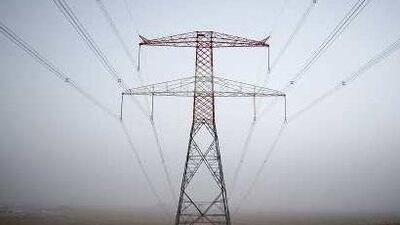Abu Dhabi may tap into its vast oil reserves to fuel its next big power plant, as it faces a double-digit increase in electricity consumption and a shortage of natural gas, a top power official says. Peak power demand jumped 11 per cent even as economic growth stagnated this year, Abdulla al Nuaimi, the director of privatisation at the Abu Dhabi Water and Electricity Authority (ADWEA), said yesterday.
The emirate has in the past burned diesel and other liquid fuels when gas supplies ran short, but it has resisted the trend in neighbouring states to use liquids as a primary fuel for power plants, describing it in a policy document last year as resulting in "extremely high economic costs, as well as poor environmental performance". But rising consumption rates, a shortage of readily available natural gas and long lead times on nuclear reactors could force the emirate to burn oil, experts said.
Calling the shortage of gas "a challenge", Mr al Nuaimi said gas, diesel and crude oil were all being considered as possible feedstocks for the next power plant, which will generate 1,500 megawatts and be unveiled to project bidders by January. But he emphasised no final decision had been made. "There is a possibility" ADWEA will use oil, he said on the sidelines of a conference hosted by MEED, the business publication based in London. "We have different choices but it has not yet been finalised."
ADWEA is still considering several potential locations for the plant, Mr al Nuaimi said. In the past decade, all of ADWEA's plants have been built in Shuweihat, Taweelah or Fujairah. The cost of an oil-fired power plant would be at least 40 per cent higher than a traditional gas plant, said Robert Bryniak, a Gulf power expert and the chief executive of the management consultancy Golden Sands. "I don't think they have many alternatives, certainly from the generation standpoint," Mr Bryniak said. "Their basic options are to go with oil or go with diesel."
Kuwait, Saudi Arabia and Iran burn large quantities of oil products to meet electricity demand, but the use of liquid fuels is considerably more expensive than gas. That cost is increased with every rise in the oil price as export resources are consumed at home, Mr Bryniak said. Abu Dhabi is already pursuing increased gas production and developing solar and nuclear power to meet a demand growth that is among the highest in the world.
The Abu Dhabi National Oil Company announced this summer that it would commit more than US$20 billion (Dh73.46bn) to two gas projects, while the Emirates Nuclear Energy Corporation is on the verge of awarding an estimated $39bn contract for a fleet of nuclear reactors, the first of which is scheduled for completion in 2017. Masdar, the Abu Dhabi Government-owned clean energy firm, has been given the task of building solar capacity to meet 7 per cent, or 1,500mw, of Abu Dhabi's electricity needs by 2020.
But in the short term, Abu Dhabi would need to also reduce demand growth substantially to avoid burning its oil for power, Mr Bryniak said. "I think it's aggressively pursuing renewables, number one, and aggressively pursuing demand management," he said. "You ought to be able to get a few thousand megawatts over a long period of time." A study commissioned by the Executive Affairs Authority and released this year found the Government could save itself the cost of two power stations if it undertakes a full-scale effort to encourage energy-saving appliances and convince consumers to be less wasteful.
@Email:cstanton@thenational.ae

